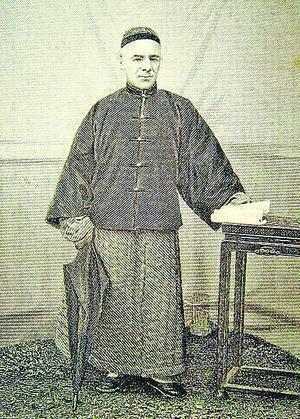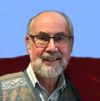William Burns was born on 1 April 1815 at Dun in Scotland, the third son of Rev. W. H. Burns and Elizabeth Chalmers. In 1821 the family moved to Kilsyth, a town of colliers and weavers about 12 miles east of Glasgow.
Of athletic build, William loved roaming the countryside armed with a fishing rod and an old gun. His ambition was to be a farmer, rather than become a minister as his father wished.
When he was 13, he lived at Aberdeen with an uncle who was a lawyer and attended the grammar school. The headmaster, Dr James Melvin, was of gaunt appearance and known to the boys as ‘Grim’, yet they held him in affection, and his love of classics laid the foundation for Burns’ future aptitude in languages.
William transferred to Marischal College of the University of Aberdeen and subsequently resolved to become a lawyer, moving to Edinburgh where another uncle, Alexander Burns, was a ‘writer to the signet’ — a privileged Scottish solicitor.
Higher call
Meanwhile, William’s eldest sister, who had been living a life of gaiety in Edinburgh, had been converted and returned home with a desire to serve the Lord. She read to the family in the afternoons from Charles Bridges on Psalm 119, but William would slip out — he preferred the grand house and riches of a lawyer.
On leaving for Edinburgh, his father presented William with Pike’s Persuasives to early piety, out of concern for his soul. This book, together with a convicting letter from two sisters and a fear of death from cholera, all served to direct William’s mind to consider how he would stand before God’s approaching judgement throne.
To inform himself more fully on these matters, he requested that he be sent some good religious reading, which surprised his family. Soon he received Thomas Boston’s Fourfold State. His family were again surprised when he appeared at the manse without warning, having walked the 36 miles from Edinburgh, declaring his desire for the Christian ministry.
The following month, Burns records that on 7 January 1832, ‘the Spirit of God shone with full light upon the glory of Jesus as a Saviour … transportingly upon his Word, and into my heart’.
Shortly after, his uncle Alexander died from cholera. In God’s providence, William had not yet legally entered his apprenticeship, so he could begin studies at the University of Aberdeen in November 1832. He attained the highest grades and won the mathematical scholarship, graduating in 1834 with honourable distinction.
Burns’ next move was to proceed to Glasgow to read divinity at the university there. He attended Milton church, where the ministry of ‘Rabbi’ Duncan had a great influence on him, as did the Students’ Missionary Society, which discussed the missionary work of Henry Martyn and David Brainerd.
Evangelist
After graduating, he offered himself to the church as an evangelist ‘in this land or among the perishing heathen … to preach to sinners the unsearchable riches of Christ crucified’.
Burns was licensed to preach the gospel, by the presbytery of Glasgow, on 27 March 1839. It should be noted that he always regarded his ministry as serving the office of evangelist-preacher, co-operating with local churches, and leaving it to their pastors to administer the sacraments and conduct church business.
A plan to go to Hindustan [India] was frustrated and meant he was free to accept a request from Robert Murray M’Cheyne, who was departing for Palestine, to take his place at St Peter’s Church, Dundee.
In the seven years from his conversion, Burns had up to this point in his ministry not seen a soul saved from the kingdom of darkness, although at Dundee there were several who had been saved as the result of M’Cheyne’s ministry.
Burns, however, relied much on the felt presence of Christ, and could not even address a handful of little children in a Sunday school without earnestly desiring the immediate presence and help of his divine Master. He once lamented: ‘I have not seen the King’s face these many days’.
It was observed that he carried about him such an awe of the divine presence and majesty, that even careless hearts received him as the messenger of God. ‘His voice’, one said, ‘was of vast compass and power, unsurpassed even by that of Mr Spurgeon’.
Revival
Burns had to return to his father’s church at Kilsyth to assist at their communion season and left Dundee on 16 July 1839. The people in Kilsyth had been encouraged to pray for revival, the last revival being in 1742-3.
They were in earnest, with an increased number of prayer meetings from 21 July, and the Spirit was poured down on 23 July. Some believers had been praying much of the night for conversions and a time of refreshing from the Lord’s presence.
Burns, with ‘an intense longing for the conversion of souls and the glory of Emmanuel’, addressed the masses assembled in the church. He preached from Psalm 110:3: ‘Thy people shall be willing in the day of thy power’.
He had read privately John Owen on the Psalms and Jonathan Edwards’ sermons, and followed their style, showing how the will of man was opposed to God, but shall be made willing to be saved, through Christ’s imputed righteousness.
We need to submit to Christ’s kingly power and be willing to bear the cross. Then we shall be with Jesus in this day of his power, when ‘the great multitude of the redeemed are gathered under his sceptre’.
Burns showed how ‘the gospel of Christ is called the power of God unto salvation to everyone that believeth’. The day of Christ’s power is a time of the outpouring of his Spirit, ‘by whose divine agency it is alone that sinners are loosed from the bondage of Satan and brought into the glorious liberty of God’s children’. Burns pleaded for the unconverted to close with God’s offer of mercy.
Many strong men fell to the ground as dead. Some screamed in agony, and believers were shouting with joy and praise. He appealed to them, ‘No cross, no crown!’, and, likening salvation to a lifeboat, cried aloud, ‘Are you in? Are you in?’
Prayer
It should be borne in mind that preceding this outpouring of the Spirit, Burns had been pleading at the throne of grace.
His brother records: ‘For weeks before, he was full of prayer. He seemed to care for nothing but to pray. In the day time, alone or with others, it was his chief delight; and in the night watches he might be heard praying aloud.
‘He had been asking, seeking, knocking for the Holy Spirit. That Spirit came with power, and the Lord added to the church daily such as should be saved’.
On another occasion, after walking around the parish of Dundee, he shut himself in his room. His host wondered why he failed to appear at lunch and, on hearing a loud groaning, entered his room to find him face down on the floor in an agony of prayer, where he remained till late evening. One missionary reckoned: ‘This prayerfulness of his seems to me to be the outstanding feature of his Christian life and missionary work’.
Burns returned to Dundee on 8 August, but was back at Kilsyth on Saturday 21 September. He engaged in prayer and praise on the boat journey, and preached to 1000 on arrival. In the morning of the following Sabbath, he addressed about 10,000 in a tent, preaching for two hours from Isaiah 54:5.
Since his last visit, there had been nightly prayer meetings, the cessation of swearing and foolish talking in the streets, the burning of impure books, and the sound of prayer and praise emerging from the noisy loom shops.
There was a far greater sense of spiritual awakening at the 7.00pm evening service, as he preached from Isaiah 54:10. He returned home at 10.00pm, as a mist settled over the tent, but was convinced he should return, this time to the church, to pray for the outpouring of the Spirit.
Three preachers spoke, before Burns was called forward and spoke at length from Psalm 116:1-4. The proceedings concluded at 3.00am, when Mr Burns and a colleague remained until nearly 6.00am counselling the distressed.
Dundee
Similar scenes to the above were repeated at Dundee. This was a much larger town, and so many streamed in from the surrounding parishes to the nightly meetings that crowds were unable to gain admission.
Often between 20 and 40 people came to Burns for counselling every day, and the greater part of the congregation remained after the normal services for special instruction.
M’Cheyne returned to Dundee on 23 November 1839 and Burns could now visit places further afield.
Part 2 is here
Nigel T. Faithfull is a retired analytical chemist and member of St Mellons Baptist Church, Cardiff.
In 2012, he published Thoughts fixed and affections flaming (Day One) concerning Matthew Henry.




